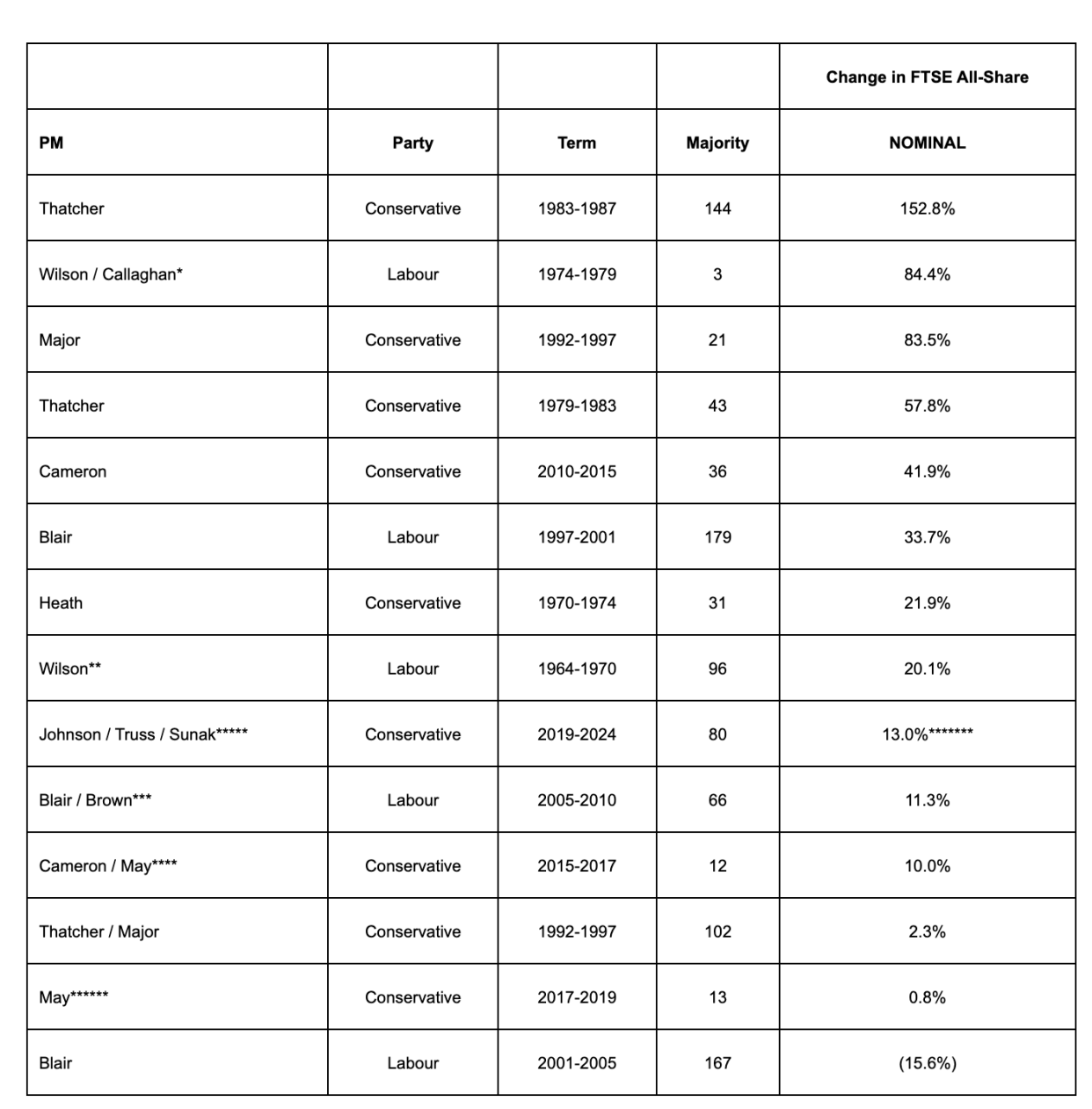What a Labour election win could mean for investors

Labour's strong lead in the polls puts the party on course to form the next UK government. Leader Keir Starmer has announced policies and changes in the party's manifesto that could have a wide-ranging impact on investors and savers.
As the UK heads to the polls on 4 July, what could a Labour win mean for investors? We break it down for you.
Tax raid? Capital gains tax may be in the spotlight
Whether a Labour government will mean an era of high tax has been one of the Conservative party's attack lines in the weeks leading up to the election, and there has been scant detail on what Labour will actually do in terms of tax if handed power on Thursday.
“This was not a manifesto for those looking for big numbers," said Paul Johnson, director of the Institute for Fiscal Studies. "The public service spending increases promised in the “costings” table are tiny, going on trivial."
Analysts agreed with this assessment, noting that the missing details almost say more than the ones put in writing.
"Labour’s manifesto may have committed not to hike VAT, income tax or national insurance, but it was light on other areas of taxation, most notably on capital gains tax, inheritance tax and the tax treatment of pensions, which all have implications for savers and investors," said Alice Haine, personal finance analyst at Bestinvest by Evelyn Partners.
Read more: What the Tory and Labour election manifestos mean for your money
For capital gains tax (CGT), the current Conservative government has already slashed the annual capital gains exemption from £12,300 in the 2022-23 tax year to the current £3,000 for the 2024-25 tax year, with similar cuts also made to the annual dividend allowance which has dropped from £2,000 to £500 over the same time period.
"Naturally, investors will be nervous of any more changes to these valuable allowances, particularly CGT which is due on gains above £3,000 when people sell investments or second homes," Haine added. "Fears that Labour might raise capital gains tax rates — from the current range of 10% to 28% depending on what asset is sold and the seller’s marginal rate of tax — to bring them in line with income tax could see investors paying even higher charges when selling investments or second homes."
"Any move to raise tax on gains made on the sale of assets could not only discourage investment but also taking risk on any investments, which sits in stark contrast to the Labour party’s wider manifesto theme of supporting wealth creation."
Aside from what's been pledged publicly, there have been rumblings about what discussions the party has been having in private when it comes to tax.
The Guardian reported last month that Labour is looking to clamp down on inheritance tax, raising money by being more stringent about tax paid on "gifts". Together with CGT increases taxing inheritance could raise up to £10bn in revenue, according to one document seen by the newspaper.
A very British ISA
Turning to savings, there has been a lot of talk about the potential for a British ISA to help kickstart more investment into the London Stock Exchange — however, there was no mention of it in the parties’ manifestos.
"Both Labour and the Conservatives have said they want to encourage saving and investing," said Susannah Streeter from Hargreaves Lansdown. "This could be done through lifting the overall ISA allowance, rather than introducing another layer of complexity."
Read more: What is the Lifetime ISA? How the retirement income option could help you
"If the aim is to make investing in UK equities more attractive, there are other measures which could be used.
"All too often, retail investors are cut out of IPOs and secondary capital raising rounds. It’s essential that the FCA Review of the listing regime puts improving retail investors’ rights at its heart."
Pensions and tax on pensions
With an ageing population, and a long-lasting commitment to the triple-lock made by the current government, pensions will be front of investors' minds as people head to the polls.
"There has been speculation that tax relief on pension contributions at their marginal rate of tax could be tinkered with," said Haine.
"[This could include] introducing a flat rate that is less beneficial for higher and additional rate taxpayers, along with worries that Labour might reduce the tax-free lump sum people can withdraw from their pensions, which is currently capped at £268,275."
Read more: What Labour and the Tories are offering pensioners in their manifestos
"With pension pots currently not subject to inheritance tax, allowing pension savings to be passed on to beneficiaries broadly free of tax, fears have also been raised that the tax break will be scrapped despite Labour’s comments that it has no plans to remove it."

Housing
Housing is a hot button issue in this election, with the Bank of England's historically high interest rates and consumer price inflation to contend with going into Autumn.
“Labour is likely to put housing near the top of its election agenda and has already pledged to ‘get Britain building again'," said Dan Coatsworth, investment analyst at AJ Bell.
Changes can be expected to the planning system with a higher emphasis on affordable homes, he added.
“The low-hanging fruit is what Labour calls the ‘Grey Belt’ — poor quality wastelands and disused car parks that are ripe for plonking homes on. These locations could soon be transformed to help solve the country’s housing crisis, but don’t expect equilibrium between supply and demand any time soon. Fixing the housing situation is a task that could take decades to complete."
Other Labour pledges have included upgrades to existing homes which have energy inefficiencies — implying a boost for construction workers, engineers and electricians.
Read more: UK house prices rise in June, despite high mortgage rates
“There are multiple companies on the UK stock market that might benefit from Labour’s housing strategy. For example, Travis Perkins (TPK.L), Wickes (WIX.L) and B&Q/Screwfix-owner Kingfisher (KGF.L) could see higher demand from tradesmen and homeowners eager for the bits and bobs needed to spruce up flats and homes," said Coatsworth.
Calming markets
Although a Labour win would not be a big shock, shadow chancellor Rachel Reeves has a job on her hands to shore up confidence in markets from the word go.
Anticipating regulation
Russ Mould, investment director at AJ Bell, thinks change might be welcomed by markets.
“The government’s chequered relationship with business and free markets makes it easier for markets to contemplate a different regime," he said.
"The current Conservative administration, whose tenure effectively dates back to 2010 and covers a flurry of five prime ministers, could be seen as having taken an increasingly interventionist approach to the economy, given such initiatives as sugar taxes, Help to Buy, energy price caps, windfall taxes on North Sea oil producers, 2021’s National Security and Investment Act and proposals for changes to the 2005 Gambling Act under the recent review.
“Increasingly vocal and forceful regulators, such as the Financial Conduct Authority, Ofcom, Ofgem, Ofwat and the Competition and Markets Authority, appear to be responding to public pressure for greater action.
Read more: What is a stock split and why are big tech companies opting for it?
“In this context, perhaps the hardest part for investors going forward will be spotting which industry or sectors will come under scrutiny next, in the wake of such recent examples as betting, funeral services and veterinary services."
Avoiding turmoil in bond markets
Hargreaves Lansdown's Streeter thinks it's bond markets that Labour needs to be careful of: "Shadow chancellor Rachel Reeves has made it clear that she intends to be economically responsible, and focus on stimulating long-term growth, rather than immediate boosts to consumer spending power.
"She wants to avoid sparking the kind of bond market turmoil, which erupted after Kwasi Kwarteng’s mini-budget.
"That’s why there were no surprise announcements in the manifesto, with the party being super-careful about pledging changes to spending or fiscal rules that could rattle financial markets.
Read more: Why interest rates matter to bonds, stocks and cash
"The priority will be on keeping the waters calm in the aftermath of the election, even with a super-majority. There may be some minor announcements before an expected budget in the Autumn in a bid to build trust."
Long-term outlook
"There is more of a risk of market turbulence after a few years of a new government bedding in, especially if the economy took a turn for the worse and the tax take dips," said Streeter.
"It would be very hard for Labour to cut services and do anything drastic with public spend and they appear to be in a bit of a tight spot with their fiscal commitments. However, Rachel Reeves has suggested that in the future borrowing rules could distinguish between day-to-day spending and investment to propel long-term growth, potentially loosening the purse strings to further support and partnerships with the private sector, above and beyond the current manifesto commitments."
"So far, such indications do not seem to have perturbed the debt markets, with bond investors appearing to be more sensitive to interest rate speculation than the investment plans of an incoming government."
How the FTSE all-share has reacted to changes of government
An AJ Bell study of all sixteen general elections since the inception of the FTSE All-Share (^FTAS) in 1962 shows that the UK stock market is by no means frightened of a change in government and it may even welcome it.
On average, the FTSE All-Share has recorded a double-digit percentage gain in the first year after an election which sees one prime minister ejected from office and another, new one ushered into it. There are also greater average gains when a government changes relative to when it remains the same, the data shows.

It doesn't seem to matter how big a majority a new leader gains, despite an advantage in the House of Commons, AJ Bell found.
Margaret Thatcher’s crushing 1983 general election win helped to set the tone for her second term and that period yielded the best nominal — and real, post-inflation — returns from the FTSE All-Share from any post-1962 administration. However, Tony Blair’s second-term majority was even bigger, and that period yielded negative returns for investors in UK equities, using the FTSE All-Share as a benchmark.
What will be interesting this time around is the degree to which inflation and the economy shape public thinking once more. The Brexit vote dealt Theresa May a difficult hand and the pandemic gave Boris Johnson a dud one, but the public will remember inflation and the cost of living crisis.
Regardless of whether voters blame that on the Bank of England’s monetary experimentation, supply chain dislocations caused by the pandemic, the oil price spike that followed Russia’s invasion of Ukraine, or just stick it on the government, may be a crucial factor in how the general election plays out.

Interest rates, inflation and economic growth
Going into Autumn, Labour could potentially have a ready made win in the form of falling interest rates, as recent data showed inflation has edged down to the Bank of England's target inflation rate of 2%.
After rates were held at a 16-year high in June, Laura Suter, AJ Bell’s personal finance director, believes August will bring an interest rate cut.
“With no meeting in July, that means all eyes are now firmly on the August meeting for our first potential cut to rates,” she said.
Money markets indicate that there is a more than 50% chance of a quarter of a point rate cut at the Bank’s next meeting, compared to 32% before its latest decision.
Yael Selfin, chief economist at KPMG UK, said: “We continue to expect the first rate cut in August, once the general election is over as inflationary pressures continue to ebb.”
Read more: When will interest rates fall and what should you do?
Ruth Gregory, deputy chief UK economist at Capital Economics, said the BoE “continued to give the impression that the pieces of the puzzle are almost in place for it to cut rates”.
She added: “The upshot is that we are sticking to our view that the Bank will first cut rates from 5.25% in August and we still think that, due to inflation falling to 1.5% later this year, the Bank will reduce rates to 3% next year rather than to 4% as markets expect.”
In terms of growth, economists at KPMG said in July that the UK economy looked to be "turning a corner". GDP figures last week showed the UK growing at a faster pace than any other G7 nation last quarter.
“While households have benefitted from a pickup in real earnings and a relatively stable labour market, business investment could also return as an engine of growth,” said Selfin.
“Political uncertainty will now resolve sooner with a summer election and a potential fiscal event in the autumn, setting out the new government’s economic agenda.”
Sterling and Starmer
As Britain heads to the polls, analysts at financial services firm Ebury sees the possibility of "mild upside" for sterling in the weeks following the election.
This upside will come "even if the immediate reaction in GBP to the exit polls and official results is minimal," says analyst Matthew Ryan.
Movement in the pound comes with hopes that Starmer's government will usher in a better UK-EU relationship and a shift to the political centre.
"We think that markets will welcome the prospect of an improvement in relations with the European Union, in particular, while the earlier than anticipated removal of the admittedly mild election risk premium could buoy consumer and business confidence, and offset the downside impact from a summer UK rate cut."
Meanwhile, modest tax hikes leave the risk of underfunded election pledges and therefore tepid growth.
Potential stock market winners and losers
AJ Bell predicts:
Potential winners include housebuilders, building materials suppliers, nuclear engineers and renewable energy specialists
Potential losers include rail operators, outsourcing providers and UK oil and gas producers
Stamping out zero-hours contracts could hurt retailers and service providers
Increased defence sector spending may not happen quickly
Hargreaves Lansdown predicts:
Housebuilders: Labour’s pledge to kickstart the building of 1.5 million new homes by shaking up the planning system and fast-tracking urban brownfield sites for development should help companies like Taylor Wimpey, which have been hampered by slow approvals of projects.
Infrastructure: Pledges to improve national infrastructure — like roads, schools and better hospitals look set to benefit construction contractors, such as Balfour Beatty.
Banking: A decisive Labour victory may help restore more confidence in the UK economy, as a party with a solid majority following on from the instability provoked by successive short-lived Conservative administrations. With pledges of funding for infrastructure, there are expectations that, if delivered, these could lead to a modest boost to GDP. This may help UK-focused banks like NatWest and Lloyds.
UK-listed aerospace stock: Labour has pledged to raise the UK’s defence spending to 2.5% of GDP as soon as resources allow, while the Conservatives set a target date of 2030 for this to come into effect.
Watch: Why interest rates matter to bonds, stocks and cash
Download the Yahoo Finance app, available for Apple and Android.


